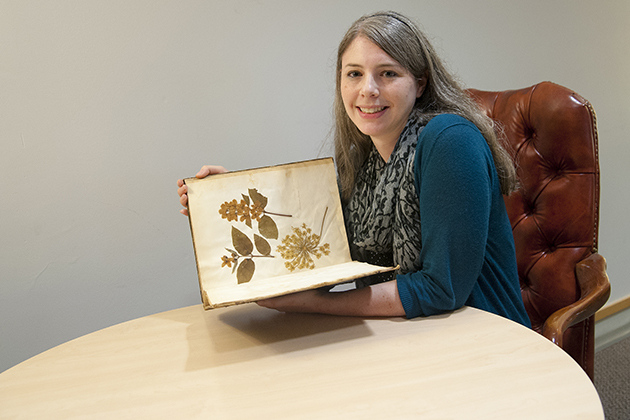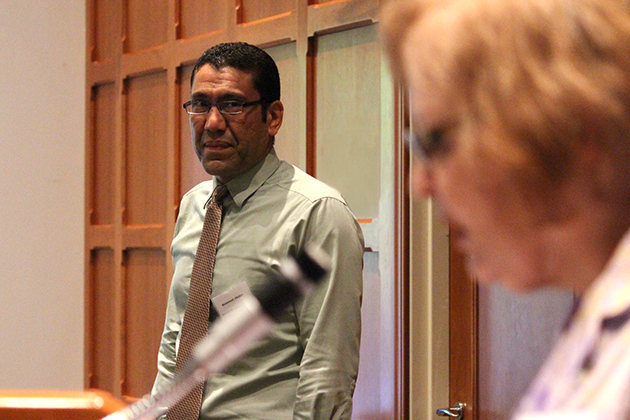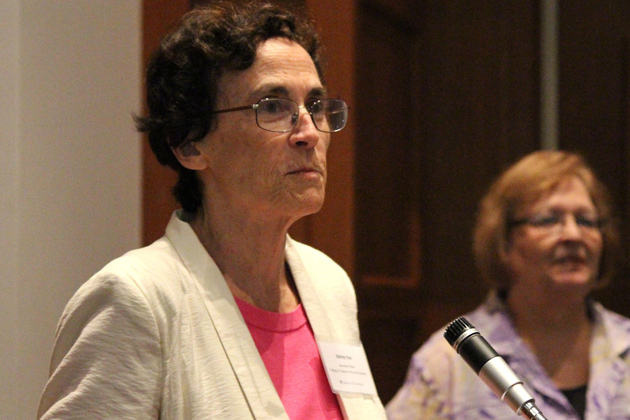
Eleven faculty and graduate students embarked this week on a year of focused research and scholarship as this year’s new class of Residential Fellows at the Humanities Institute.
The scholars, selected from UConn faculty and graduate students and scholars at other universities, will spend the year working in the Institute on projects involving linguistics, philosophy, history, medieval studies, anthropology, and literature.
“The Humanities Institute is not just a place where we come together to learn about each other’s research,” said Shirley Roe, College of Liberal Arts and Sciences associate dean for the humanities, at a reception welcoming the new Fellows. “The Institute represents the recognition by the College and the University of what we do as researchers and writers – as humanists.”
Now in its 13th year, the Institute, located in the Philip E. Austin building, seeks to enhance research and creativity in broadly-defined areas in the humanities. In addition to the fellowship program, the Institute sponsors undergraduate fellowships; offers advanced courses in humanities fields; presents symposia, conferences, and public programs; and brings outside scholars and authors to Connecticut.
“Like all of us, my work is necessarily interdisciplinary,” says Jessica Linker, the inaugural recipient of the James L. and Shirley A. Draper Graduate Dissertation Fellowship in Early American studies. “Being here will help me see how everyone else thinks.”

“UConn has a great reputation, and the Humanities Institute will give me a chance for encouragement and interaction with other scholars,” adds Mohammed Albakry, associate professor of English and applied linguistics from Middle Tennessee State University.
Albakry will spend his year in Storrs working on an anthology of contemporary Egyptian drama, focusing on plays that are products of the current Egyptian revolutionary movement.
“This is a transformative time in Egypt’s history,” he said. “It impacts everyone, including theater artists. Drama is so interactive, it has the power to be a cultural mediator. ”
People think that in the humanities we’re always studying things that happened long ago in literature and history. But in many instances, people see what they study changing before their very eyes.
Albakry grew up in Alexandria, Egypt and came to the United States for his academic work in 1999. He has translated many Egyptian plays from Arabic to English and given them critical context, with the goal of increasing understanding by American audiences. The variety of plays he’s chosen for his anthology, he says, have a diversity of voices and theatrical techniques.
“These plays really bring in the humanistic perspective: the nuanced, insider perspective of the revolution,” he said. “It’s very different from the mainstream media narrative. [The plays] talk about people’s hopes and fears.”

The director of the Humanities Institute, Sharon Harris, says Albakry’s work is a prime example of the currency of the Fellows’ research.
“People think that in the humanities we’re always studying things that happened long ago in literature and history,” she said. “But in many instances, people see what they study changing before their very eyes.”
Albakry hopes to collaborate with UConn’s Connecticut Repertory Theatre on dramatic readings and discussions of the plays in the coming year. He’s also looking forward to taking advantage of what he calls the “research energy” of the Humanities Institute.
Linker’s work involves uncovering the scientific practices of Early American women in the 18th and 19th centuries. She will spend her fellowship year completing her dissertation work, which challenges the assumption that few women were involved in science in Early America.
“It’s not that women were historically not involved in science, but that they somehow went missing from the historical record,” she said. In most well-known records, she said, “they keep popping up, but then disappearing.”
A major part of Linker’s work deals with botany; women often pressed leaves and other plant parts into books, where they classified, identified, compared, and sometimes even drew them.
But because women frequently didn’t have their own materials, they would press these plant parts into books with other uses, such as autograph books or used business ledgers. Linker sifts through collections at museums, libraries, and archives to find this overlooked evidence that Early American women were much more involved in science than previously thought.
“Most people think that women were never really involved in science, when they actually were,” she said. “We’re still dealing with the gender gap and these obstacles that were set up, perhaps without reason.”
Linker says the time at the Institute will certainly improve her dissertation work: “I’m really looking forward to being here and getting feedback from all the other Fellows.”
The full list of 2013-2014 Humanities Institute Fellows:
- Mohammed Albakry, associate professor of English and applied linguistics, Middle Tennessee State University
- Nicola McDonald, professor of English and related literature, University of York, United Kingdom
- Peter Baldwin, associate professor of history, UConn
- Kelly Dennis, associate professor of art history, UConn
- Robin Greeley, associate professor of art history, UConn
- Robert Gross, James L. and Shirley A. Draper Professor of Early American History, UConn
- Gregory Kneidel, associate professor of English, UConn
- Sarah Willen, assistant professor of anthropology, UConn
- Brandon Hawk, Ph.D. candidate in medieval studies, UConn
- Michael Hughes, Ph.D. candidate in philosophy, UConn
- Jessica Linker, Ph.D. candidate in history, UConn



